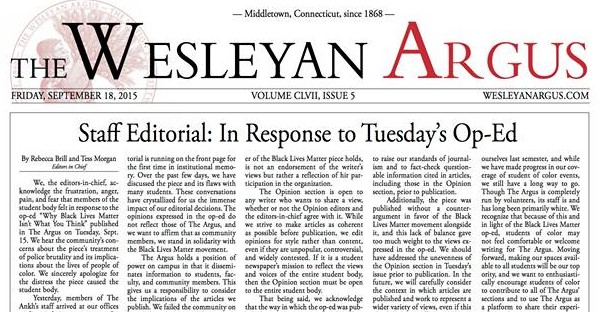
The protesters are well within their rights to speak out against the argument made in the op-ed, and criticize the paper for "historically fail[ing] to be an inclusive representation of the voices of the student body." They also identified legitimate ways that the paper could be more responsive, including "Active Recruitment and Advertisement"—presumably to minority students—and creating "work study/course credit positions" that could build a more diverse staff.
The Argus appeared genuinely receptive to readers' complaints. The paper editorialized on September 17 that it wants to "enthusiastically encourage students of color to contribute to all of The Argus’ sections and to use The Argus as a platform to share their experiences and opinions." While the Argus cannot institute a work study program on its own, it endorsed that as a means to promote diversity. It plans an upcoming issue "written entirely by students of color," and the paper is "committed to making space for the student of color population in this publication in the future, including creating a column to discuss issues of race and racism at Wesleyan."
Some student government leaders have strong opinions about the controversy. In an email, Wesleyan Student Association President Kate Cullen and Vice President Aidan Martinez declared that they "are supportive of the push for a more equitable and inclusive Argus… We hope that the cries for change from the students of color community will move The Argus’s leadership to action."
This dialogue could be seen as quite encouraging. But the petition protesting Bryan Stascavage's op-ed also called for the removal of funding for the student newspaper unless it met their list of demands, and the physical removal of copies of the paper in the meantime.
Taking away copies of the paper and asking for it to be defunded are tactics completely at odds with core free expression principles, and signal a dangerous enthusiasm for attempting to silence an outlet over speech that some find disagreeable. As Paul Singley of the Connecticut Society of Professional Journalists stated, it is "a dangerous thing when you have the people that are controlling your purse strings determining what kind of opinions you’re going to allow to be shared in your publication.”
In trying to be responsive to criticism, The Argus seemed to have gone too far by declaring its sincere apologies “for the distress the piece caused the student body," adding that it had "failed the community." While the paper is free to disagree with the columnist, failing to defend his right to hold an opinion or their own right to publish it was unfortunate. The Argus told readers that the piece "cites inaccurate statistics and twists facts," though it offered no further details.
It is unclear whether this petition will eventually lead to a formal resolution to defund the Argus, or whether it will be chilled into self-censorship. The discussions about the paper will no doubt continue. And as they do, student government representatives as well as editorial staff should take a clear position in defense of free expression, editorial independence, and the First Amendment. This is especially true for activists dedicated to social change, who should understand that social justice movements have succeeded only because people were able to speak out and protest, even if they insulted and offended others in the process.

